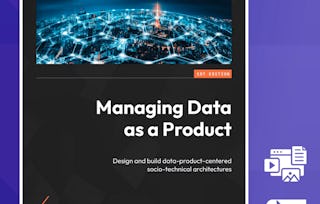In today’s data-driven world, the ability to design and manage effective Enterprise Data Architecture (EDA) is a highly sought-after skill for career opportunities in data strategy, architecture, and management. Whether you want to advance in your current role as a data engineer or database administrator or transition to a specialized position like a data architect or enterprise data strategist,

Enterprise Data Architecture and Operations

Enterprise Data Architecture and Operations
This course is part of multiple programs.


Instructors: Ramesh Sannareddy
2,253 already enrolled
Included with
12 reviews
Recommended experience
What you'll learn
Importance, benefits, and core components of Enterprise Data Architecture (EDA) and popular data architecture frameworks.
How to design and implement Enterprise Data Architectures for specific use cases.
How to develop and implement policies and procedures, such as data retention policies and operational standards.
How to plan and execute data system migrations and modernizations.
Skills you'll gain
Details to know

Add to your LinkedIn profile
See how employees at top companies are mastering in-demand skills

Build your subject-matter expertise
- Learn new concepts from industry experts
- Gain a foundational understanding of a subject or tool
- Develop job-relevant skills with hands-on projects
- Earn a shareable career certificate

There are 3 modules in this course
This module provides foundational knowledge and a practical approach to designing an Enterprise Data Architecture (EDA). You will learn about the importance of EDA in managing data assets and discover the benefits of a good EDA. The module explores the key building blocks of EDA and the foundational data models—conceptual, logical, and physical—and their roles in structuring and organizing data. You will understand popular data architecture frameworks such as TOGAF, DAMA-DMBOK, and the Zachman Framework. The module also focuses on applying EDA principles in real-world scenarios by guiding through the process of designing data architecture for an e-commerce company.
What's included
10 videos2 readings3 assignments6 plugins
This module focuses on the processes and practices involved in managing and modernizing enterprise data operations, including core data processes, ETL practices, DataOps practices, and the data lifecycle. Through focused videos, you’ll gain a strong understanding of how organizations manage and optimize their data workflows. You will also learn to design policies and schemas tailored to specific business needs and compliance requirements. The module also provides essential knowledge and a practical approach to plan and execute data migrations and system modernizations, covering strategies for planning migrations and implementing modernization programs. You will also gain an understanding of the impact of application architectures on data operations. Finally, you’ll explore how emerging technologies and paradigms can be integrated into existing enterprise environments to drive innovation and efficiency in data management and operations.
What's included
8 videos1 reading3 assignments2 app items5 plugins
The module includes a final project based on the concepts covered in the course. In this module, you will attempt a graded quiz to test and reinforce your understanding of concepts. The module also includes a glossary to enhance comprehension of generative AI-related terms.
What's included
1 video3 readings1 assignment1 peer review1 app item1 plugin
Earn a career certificate
Add this credential to your LinkedIn profile, resume, or CV. Share it on social media and in your performance review.
Offered by
Explore more from Data Management
 Status: Free Trial
Status: Free Trial Status: Free Trial
Status: Free Trial Status: Free Trial
Status: Free Trial
Why people choose Coursera for their career

Felipe M.

Jennifer J.

Larry W.

Chaitanya A.

Open new doors with Coursera Plus
Unlimited access to 10,000+ world-class courses, hands-on projects, and job-ready certificate programs - all included in your subscription
Advance your career with an online degree
Earn a degree from world-class universities - 100% online
Join over 3,400 global companies that choose Coursera for Business
Upskill your employees to excel in the digital economy
Frequently asked questions
This course is designed for aspiring data architects, engineers, IT professionals, and database administrators who want to optimize their organization’s data systems and operations.
To access the course materials, assignments and to earn a Certificate, you will need to purchase the Certificate experience when you enroll in a course. You can try a Free Trial instead, or apply for Financial Aid. The course may offer 'Full Course, No Certificate' instead. This option lets you see all course materials, submit required assessments, and get a final grade. This also means that you will not be able to purchase a Certificate experience.
When you enroll in the course, you get access to all of the courses in the Certificate, and you earn a certificate when you complete the work. Your electronic Certificate will be added to your Accomplishments page - from there, you can print your Certificate or add it to your LinkedIn profile.
More questions
Financial aid available,
¹ Some assignments in this course are AI-graded. For these assignments, your data will be used in accordance with Coursera's Privacy Notice.


